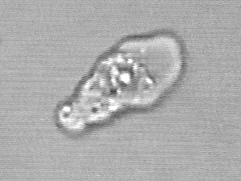I was given a sample of pond water to examine and report on the content.Having viewed several 'drops' of the sample, only Tracehelomonas and Euglena appeared to be present.
However having viewed for a while, using the high power, I noticed an out of focus movement. Focusing in I saw that this was an amoeboid form.
Viewing its movement and general appearance, with the video microscope, I formed the opinion that it was an amoeba of the Naegleria genus.
These are small amoebae, around 30µm and monopodial. The pseudopodia develop in a series of eruptive bulges, to one side of the anterior margin of the cell.
Visible in the accompanying image are the hyaline cap, and the contractile and food vacuoles. Also, posteriorly, can be seen the temporary uroid.
Brightfield, 40x objective.Naegleria is interesting in that one of the species, N. fowleri, is a lethal pathogen in man causing primary amoebic meningo-encephalitis. This enters the central nervous system via the nasal passages. Also interesting is that it grows at temperatures of around 30ºC, though is quite happy at temperatures in the mid 20ºC region. The latter being the temperature of heated swimming pools.
Although N. fowleri is considered to be the lethal pathogen, N. gruberi is not yet entirely in the clear.
Species identification is very much a specialist procedure and cannot be achieved by light microscopy alone.
Comments to the author Mike Morgan are welcomed.
Safety Note
In view of the nature of some organisms which may be found in pond water, it is advisable, especially for anyone attempting to isolate and grow protozoa, that at least basic standards of cleanliness and safe practice should be adopted.
Practices such as mouth pipetting and eating or drinking in the culture area should be strictly taboo.
There should also be facilities for cleaning, by disinfectants, or disposal of contaminated glassware and discarded cultures.
